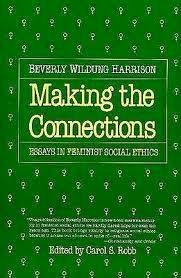
Recently, when I wrote about Andrew Sullivan's take on Jonathan Rauch's essay calling for special tolerance for those who oppose same-sex marriage out of sincere religious conviction, I concluded by noting,
This is how I see these matters as a theologian whose primary field of theological work has been to try to understand processes of social transformation, and who has become strongly convinced that until the voices of women, the poor, gays, and others who have been roughly shoved from the public square and from ecclesial conversations can be heard — in their own quite uncivil cadences — we cannot build humane societies or religious institutions with any claim to credibility.
My point is that I think and write about these matters as a theologian, as someone accustomed now for years to hearing other theologians insist that our conversations about social and ecclesial issues will not be effective until they find ways to draw in, include, and hear those on the margins of society — and, in particular, women, the poor, people of color, and sexual minorities. I find it baffling (but entirely understandable) that insights now taken for granted among many (but certainly not all) theologians have so little play in cultural conversations about issues like racism or misogyny or homophobia.
I understand why this is the case, of course: they've deliberately been kept out of these conversations. The centrist gatekeepers who determine what perspectives will be permitted to be represented in important conversations of the public square have for years now deliberately marginalized theologians with perspectives to the left of the political center. Those gatekeepers are not themselves usually conspicuously well-educated in matters theological. They have frequently not read (and do not intend to read) the significant works of liberationist, feminist, or black theology that have revolutionized theological discourse from the latter half of the 20th century up to now.
And I'm thinking about all of these matters right now as I read about the interplay of racism and misogyny in the story of Donald Sterling. As Travis Waldron notes today for Think Progress, what has been lost sight of in some commentaries about Sterling's recent racist outburst (taped by his girlfriend) is that his remarks are not merely racist: they're also deeply sexist. Sterling has a long record of manifest racism intertwined with manifest misogyny.
And I wonder as I read these stories why they come as a shock, or why we typically miss such important notes in stories like this, when theologian Beverly Wildung Harrison told us as long ago as 1985 in her important work Making the Connections that racist cultures are also likely to be misogynistic ones, as well as homophobic and militaristic ones. Thsee -isms hang together in a single web of patriarchy.
I wonder why the ground-breaking insights of feminist theologians like Harrison, which are now taken for granted by many theologians who pursue our work in her footsteps, have had such little play in political conversations in the public square in the U.S.?
When they're obviously tailor-made for those conversations — if we really do want to address issues like racism or misogyny or homophobia effectively in our culture . . . .

